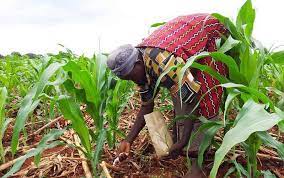In a significant step to advance food security in Kenya, the Africa Fertilizer Financing Mechanism (https://apo-opa.co/3W642uA) has launched a project that will help deliver nearly 8,000 tons of fertilizers to 100,000 smallholder farmers, boosting harvests and incomes.
Through its Fertilizer Financing for Sustainable Agriculture Management Project (https://apo-opa.co/3QfyVsr), the Mechanism will provide a $2 million partial trade credit guarantee and a grant of $219,000 to Apollo Agriculture Limited (https://www.ApolloAgriculture.com/), a Kenyan corporation, to facilitate the company’s fertilizer sales.
The Norwegian Agency for Development Cooperation, through a contribution of $10.15 million to the Africa Fertilizer Financing Mechanism, is also supporting the project, which was launched on 8 April in the capital, Nairobi. Representatives of the African Development Bank, which manages the Mechanism, Apollo Agriculture and the Kenyan and Norwegian governments attended the launch event.
Kenyan smallholder farmers often lack the collateral to secure financing to buy the fertilizers they need. The Mechanism, by sharing credit risk with suppliers like Apollo Agriculture, bolsters their confidence to offer fertilizer on credit.
Marie Claire Kalihangabo, Coordinator of the Africa Fertilizer Financing Mechanism, said, “The credit risk guarantee also provides finance directly to smallholder farmers at the last mile of delivery. It offers fertilizer, certified seed crop protection, and insurance against crop failure.”
The two-year-long project will use Apollo’s digital platform to connect farmers seeking fertilizer and other inputs on credit with a network of 150 retail agro-dealers and 800 village-based agents. Kenya’s fertilizer market involves importers, blenders, and a government subsidy program.
Nnenna Nwabufo, Director General of the African Development Bank’s East Africa regional office, said, “This support is in line with the Bank’s Feed Africa Strategy. It will ensure long-term private sector engagement in financing fertilizer, ultimately increasing food production and security in Kenya.”
Benjamin Njenga, co-founder of Apollo Agriculture, explained that farmers can obtain high-quality farming supplies by paying a small deposit upfront, with the full loan being due when the farmer has harvested and sold the produce.
“We believe increased and proper fertilizer use can significantly impact food supply and household income,” Gunnar Holm, Norwegian Ambassador to Kenya, said at the launch.
Peter Owoko, Director of Policy at the Ministry of Agriculture and Livestock Development, announced new initiatives to strengthen Kenyan food security. “During the 2024 cropping seasons, the government targets to avail up to 12.5 million tons of fertilizers to farmers under the subsidy program.” He thanked the African Development Bank for granting Kenya $67 million in 2022-2023 through its African Emergency Food Production Facility.
Apollo Agriculture has already begun implementing the Fertilizer Financing for Sustainable Agriculture Management Project in Kenya’s Bungoma and Uasin Gishu counties, targeting maize production. There are high expectations that yields will increase for the harvest season starting in September 2024.
The project aligns with Kenya’s Vision 2030, which identifies agriculture as a key driver of the country’s economic growth and food security.


